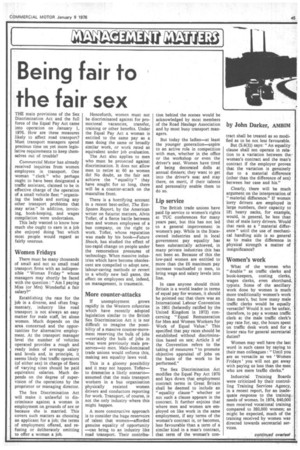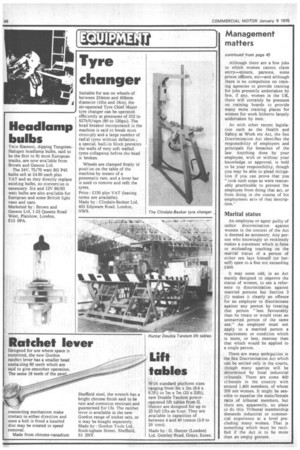Being fair to the fair sex
Page 47

Page 48

If you've noticed an error in this article please click here to report it so we can fix it.
by John Darker, AMBIM
THE main provisions of the Sex Discrimination Act and the full farce of the Equal Pay Act came into operation on January 1, 1976. How are these measures likely to affect road transport? Must transport managers spend precious time on yet more legislative requirements to keep themselves out of trouble?
Commercial Motor has already received inquiries from women employees in transport, One woman " clerk " who perhaps ought to have been designated a :traffic assistant, claimed to be in effective charge of the operation of a small vehicle fleet "organising the loads and sorting any other transport problems that may arise." In addition, invoicing, book-keeping, and wages compilation were undertaken.
This lady wanted to know how much she ought to earn in a job she enjoyed doing but which most people would regard as fairly onerous.
Women Fridays
There must be many thousands of small and not so small road transport firms with an indispensible "Woman Friday" whose managers may shortly be faced with the question : "Am I paying Miss (or Mrs) Wonderful a fair salary?"
Establishing the rate for the job in a diverse, and often fragmentary, industry like road transport is not always an easy matter for male staff, let alone women. Much depends on the area concerned and the opportunities for alternative employment. At the transport manager level the number of vehicles operated provides a rough and ready index of average salary and levels and, in principle, it seems likely that traffic operators (of either sex) in charge of fleets of varying sizes should be paid equivalent salaries. Much depends on the degree of supervision of the operations by the proprietor or managing director.
The Sex Discrimination Act will make it unlawful to discriminate against a woman in employment on grounds of sex or because she is married. This covers such matters as choosing an applicant for a job; the terms of employment offered, and refusing or deliberately omitting to offer a woman a job. Henceforth, women must not be discriminated against for promotional vacancies, transfer, training or other benefits. Under the Equal Pay Act a woman is entitled to the same pay as a man doing the same or broadly similar work, or work rated as equivalent under job evaluation.
The Act also applies to men who must be protected against discrimination. It does not allow men to retire at 60 as women do! No doubt, as the fair sex achieve the " equality " they have •sought for so long, there will be •a counter-attack on the masculine front.
There is a horrifying account in a recent best-seller, The EcoSpasm Report, by the American writer on futurist matters, Alvin Toner, of a fierce battle between men and women employees of a bus company, on the right to work. Tofler, whose reputation was made by his book—Future Shock, has studied the effect of too-rapid change on people under the remorseless pressures of technology. When massive industries which have become obsolescent are compelled to adopt new, labour-saving methods or revert to a wholly new ball game, the effect on employees and, indeed, on management, is traumatic.
More counter-attacks
IT unemployment . grows rapidly in the Western cduntries which have recently adopted legislation similar to the British Sex Discrimination Act it is not difficult to imagine the possibility af a massive counter-movement reserving the bulk of jobs —certainly the bulk of jobs in what were previously male preserves—to men. Male-dominated trade unions would enforce this, making sex equality laws void.
This is a gloomy possibility and it may not happen. Toiler— to dramatise a likely scenario— assumed that the male transport workers in a bus organisation physically resisted women drivers and conductors reporting for work. Transport, of course, is not the only industry -where this might happen.
A more constructive approach is to consider the huge reservoirs of talent that women—afforded genuine equality of opportunity —can bring to an industry like road transport. Their contribu tion behind the scenes would be acknowledged by most members of the Road Haulage Association and by most busy transport managers.
But today the ladies—at least the younger generation—aspire to an active role in competition with men, whether in the office or the workshop or even the driver's seat. Women have tired of being decorated dolls at annual dinners; they want to get into the driver's seat and stay there, on merit, if their talents and personality enable them to do so.
Lip service
The British trade unions have paid lip service to women's rights at TUC conferences for many years past, but this •has not led to a general improvement in women's pay. While in the Stateowned industries and in local government pay equality has been substantially achieved, in many private industries this has not been so. Because of this the low-paid women are entitled to more than the E6 maximum pay increase vouchsafed to men, to bring wage and salary levels into line.
In case anyone should think Britain is a world leader in terms of equal pay for women, it should be pointed out that there was an International Labour Convention in 1961 (belatedly ratified by the United Kingdom in 1972) concerning "Equal Remuneration for Men and Women Workers for Work of Equal Value." This specified that pay rates should be established without discrimination based on sex; Article 3 of the Convention refers to the taking of measures "to promote objective appraisal of jobs on the basis of the work to be performed."
The Sex Discrimination Act modifies the Equal Pay Act 1970 and lays down that employment contra& terms in Great Britain shall be deemed to include an "equality clause" whether or not such a clause appears in the contract. It further enjoins that where men and women are employed on like work in the same employment, if any terms of the woman's contract is, or becomes, less favourable than a term of a similar kind in a man's contract, that term of the woman's con
tract shall be treated as so modified as to be not less favourable.
But (S.8(3)) says: "An equality clause shall not operate in relation to a variation between the. woman's contract and the man's contract if the employer proves that the variation is genuinely due to a material difference (other than the difference of sex) between her case and his."
Clearly, there will be much argument on the interpretation of "material difference." If women lorry drivers are employed in large numbers, their capacity to lift heavy sacks, for example, would, in general, be less than that of male lorry drivers. Would . that rank as a "material difference " until the use of mechanical handling aids is so general as to make the difference in physical strength a matter of insignificance?
Women's work
What of the women who "double" as traffic clerks and book-keepers, costing clerks, wages clerks, even shorthand. typists: Some of the ancillary work done by women is much more traditionally women's work than men's, but how many male traffic clerks would be equally versatile? Would it not be unfair, therefore, to pay a woman traffic clerk at the male traffic clerk's pay rate for, say, the hours spent on traffic desk work and for a lower rate for general secretarial duties?
Women may well have the last word in such cases by saying to their men colleagues : "Until you are as versatile as we 'Women Fridays' you will not get away with paying us less than the men . who are mere traffic clerks."
Industrial Training Boards were criticized by their controlling Training Services Agency, in a recent report, for an inadequate response to the training, needs of women. In 1974, 840,000 men received vocational training compared to 393,000 women; as might be expected, much of the training received by women was directed towards secretarial services.
Although there are a few jobs to which women cannot claim entry—miners, parsons, some prison officers, etc—and although there is no compulsion on training agencies to provide training for jobs presently undertaken by few, if any, women in the UK, there will certainly 'be pressure on training boards to provide many more training places for women for work hitherto largely undertaken by men.
As with other recent legislation such as the Health and Safety at Work etc Act, the Sex Discrimination Act identifies the responsibility of employers and principals for 'breaches of the law. Anything done by your employee, with or without your knowledge or approval, is held to be your responsibility, though you may be able to plead mitigation if you can prove that you "took such steps as were reasonably practicable to prevent 'the employee from doing that act, or from doing in the course of his employment acts of that description."
Marital status
An employee or agent guilty of unfair discrimination against women in the context of the Act is deemed an accessory. Any person who knowingly or recklessly makes a statement which is false or misleading touching on the marital status of a person of either sex lays himself (or herself) open to a fine not exceeding £400.
It may seem odd, in an Act mainly, designed to improve the status of women, to see a reference to discrimination against married persons but Section 3 (1) makes it clearly an offence for an employer to discriminate against any person by treating that person "less favourably than he treats or would treat an unmarried person of the same sex." An employer must not apply to a married person a requirement or condition which is more, or less, onerous than that which would be applied to a single person.
There are many ambiguities in the Sex Discrimination Act which can be settled only in the courts, though many queries will be determined by local industrial tribunals. There are some 400 tribunals in the country with around 1,400 members, of whom 350 are women. It might be sensible to equalise the male/female ratio of tribunal members, but there are; apparently, no plans to do this. Tribunal membership demands industrial or commercial experience at a level precluding many women. That is something which must be rectified if the Act is to be more than an empty gesture.




















































































